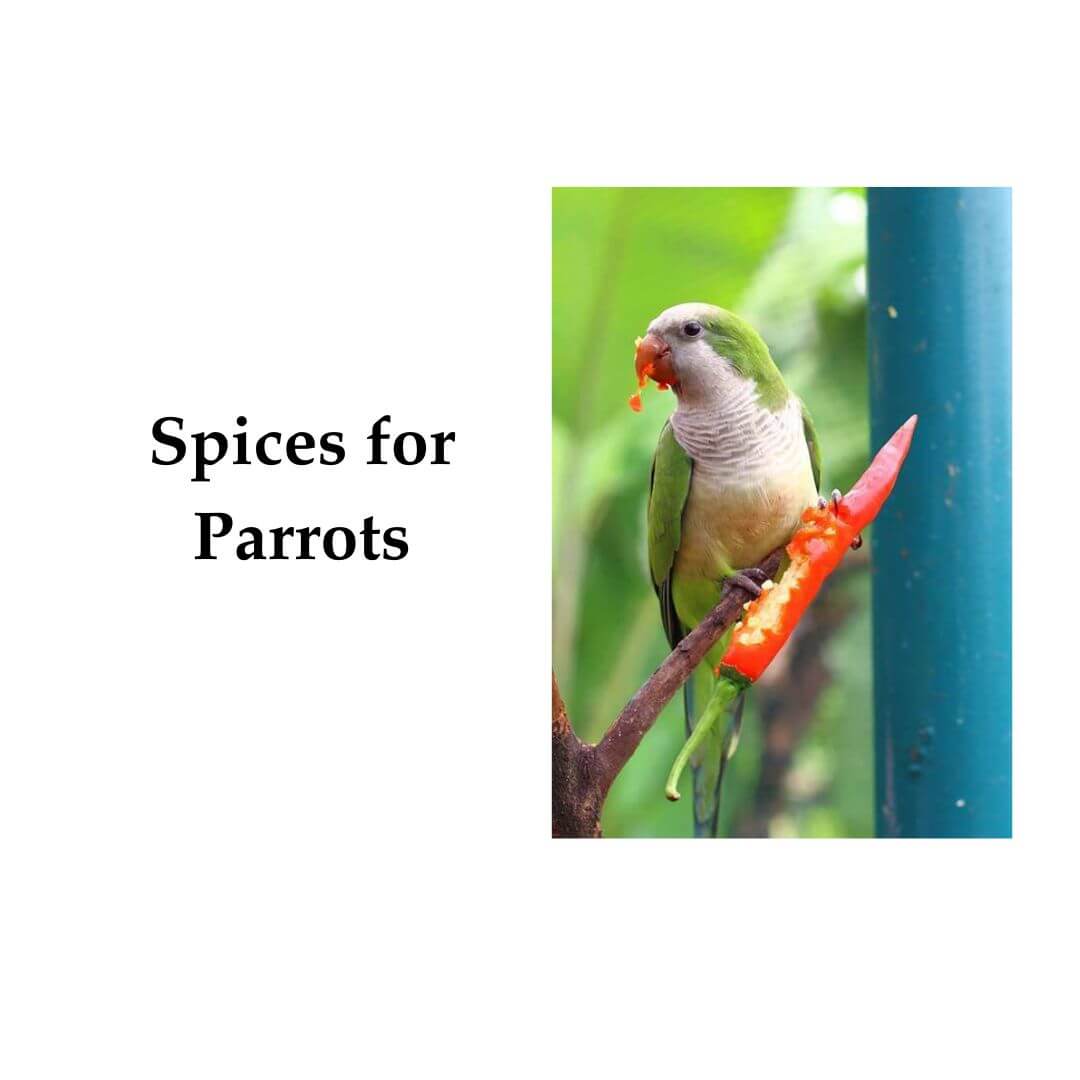
Spices for Parrots: A Flavorful Journey with Health Benefits.
Share
Introduction To Spices for Parrots
In this comprehensive guide, we delve into the world of spices for parrots. Our mission is to provide you with a valuable resource that not only educates but also empowers you to make informed choices when it comes to incorporating spices into your parrot's diet. We understand that the well-being of your pet bird is of utmost importance, and our aim is to help you navigate this aspect of their nutrition.

Pin Me!
Important Information Before We Start
It's important to note that while spices offers potential health benefits, it should be used sparingly and in diversity, as part of a balanced diet. As I share in The Science of Avian Nutrition, adding the right spice to a parrot’s diet can enhance flavor without relying on salt or sugar which are harmful to your bird's health and not recommend.
Understanding the Benefits of Spices For Parrots
Spices have been used for centuries to enhance the flavor of food and, in many cases, for their potential health benefits. When it comes to parrots, certain spices can also offer advantages. Let's explore some of the key benefits:
1. Digestive Aid
Spices like ginger and turmeric can aid in digestion for parrots. They stimulate the digestive system and may alleviate gastrointestinal discomfort.
2. Antioxidant Properties
Many spices are rich in antioxidants, which can help combat free radicals in your parrot's body, promoting overall health.
3. Natural Immunity Boost
Spices such as cinnamon contain natural compounds that may enhance your parrot's immune system, helping them fend off illnesses.
4. Lowering Blood Sugar
Some spices can help regulate and improve insulin function
5. Weight Management
These spices contribute to a feeling of fullness, potentially reducing overeating, and aiding in weight management.
6. Lowers Cholesterol:
Some Spices like cumin helps heart health and reduce the risk of heart disease. It contains compounds like saponins and fiber that can help regulate cholesterol levels.
7. Anti-inflammatory:
These spices have properties that may be beneficial in managing conditions like arthritis and other inflammatory disorders.
8. Improves immunity:
Spice may strengthen the immune system and help the body fight off infections.
9) Weight Management:
Promoting feelings of fullness and reducing overeating. It may also help boost metabolism and fat burning.
10) Antibacterial and Antifungal Properties:
They may help combat certain infections when used in traditional remedies.
Click Me
Safe Spices for Parrots
The nutritional value and potential wellness advantages of spices reveals why it's more than just a culinary delight. Here's a list of bird-friendly spices for parrots:
1. Ceylon Cinnamon
Cinnamon is not only a flavorful spice but also has potential anti-inflammatory properties. Use it sparingly, as some parrots may find it too strong.
2. Allspice
Allspice is a spice made from the dried berries of the Pimenta dioica tree, some potential health benefits includes, antioxidant and anti inflammatory properties, aid in digestion, and pain relief.
3. Turmeric
Turmeric is known for its anti-inflammatory and antioxidant properties. It can be an excellent addition to your parrot's diet in small amounts.
4. Caraway
Caraway is another herb that can be included in your parrot's diet. It provides a unique taste and some potential health benefits.
5. Celery seeds
Packed with nutrients and offering a range of health benefits, these tiny seeds can be a flavorful and health-conscious choice.
6.Cloves
Cloves are more than just a flavorful spice; they are a treasure trove of wellness benefits including, antioxidants, anti-inflammatory, aid digestion, and supports the immune system.
7. Coriander seed
Coriander seeds are more than just a flavorful spice; they are a nutritional powerhouse with the potential to enhance your well-being.
8. Cumin
Cumin offers numerous health benefits from digestion aid to lowering cholesterol. Cumin also helps as an antioxidant, heart health, and high blood pressure.
9. Dill seeds
These little seeds are packed with a surprising range of health benefits; calming effects, digestion aid, natural antibacterial properties, stabilizing blood sugar, and have anti-inflammatory properties.
10. Dry chili/Paprika
Dry chili has a lot to offer in terms of taste and well-being. boost metabolism and increase calorie burning, pain-relieving benefits, lower blood pressure, antioxidants and anti-inflammatory compounds.
11. Fenugreek
Fenugreek is a versatile herb that offers improvement in digestion, lowers blood sugar, aids in weight management, lowers cholesterol, anti-inflammatory properties, rich in antioxidants.
12. Fennel seeds
Fennel seeds are known for their distinct flavor and have been used for centuries for both culinary and medicinal purposes which includes; aids digestion,anti-inflammatory properties and antioxidant
13. Ginger
Ginger is a popular spice and medicinal herb that has been used for centuries for its numerous health benefits. Some benefits includes: pain relief, anti-inflammatory, antioxidant, alleviate nausea and vomiting, cardiovascular health, strengthen the immune system, and antimicrobial.
14. Juniper berries
Juniper berries are the small, aromatic cones of the juniper tree that are rich in antioxidants, aid in digestion, and antibacterial and antifungal effects
15. Mustard seeds
Mustard seeds are rich in nutrients, health health, cancer prevention, antioxidant and anti inflammatory.
16. Nigella
Some of the reported health advantages of nigella are antioxidant and anti inflammatory properties, immune system support, lowering blood sugar levels, and heart health,
17. Star Anise
Antibacterial and antifungal properties, digestive health, pain relief, antioxidant and anti inflammatory properties, and regulating blood sugar.
18. Vanilla
Vanilla is most used to enhance the taste of various foods and beverages, however it offers a few potential health benefits as well antioxidants, mood enhancer, aid in digestion, anti- inflammatory properties, and calming effect.
Spices to Avoid For Parrots
While some spices can benefit parrots, others are best avoided due to their potential toxicity. Here are some spices you should never feed your pet bird:
1. Nutmeg
Nutmeg can be toxic to parrots, leading to severe health issues. Keep it far away from their food.
2. Onions
These members of the allium family can cause gastrointestinal distress and should be excluded from your parrot's diet.
3. Cassia Cinnamon
Cassia cinnamon, also known as Chinese cinnamon (Cinnamomum cassia), contains relatively high levels of coumarin, a natural compound that can act as a blood thinner. Coumarin can be toxic to birds, and excessive consumption of cassia cinnamon can potentially lead to liver damage or failure in birds.
4. Mace
Mace, which is the outer covering of the nutmeg seed (Myristica fragrans), contains compounds that can be harmful to birds, especially in larger quantities. Mace and nutmeg both contain myristicin and other compounds that act as central nervous system depressants and can be toxic to birds when ingested in excess.
Incorporating Spices into Your Parrot's Diet
Now that you're familiar with the safe spices for parrots, let's discuss how to incorporate them:
-
Gradual Introduction: Start with a tiny amount and monitor your parrot's reaction.
-
Mix with Food: Sprinkle a small amount of the chosen spice onto your parrot's regular food to introduce the new flavor gradually.
-
Variety: Rotate different spices to keep your parrot's diet interesting and ensure a balanced intake of nutrients.
For natural flavor and added nutrition, explore our Herbs for Parrots Herbs for Birds guide to discover which herbs are safe and beneficial for your parrot.
Conclusion To Using Spices for Parrots
In conclusion, spices can be a valuable addition to your parrot's diet when used judiciously and with care. They can not only enhance the taste of their meals but also offer potential health benefits. Remember always to prioritize your parrot's well-being and consult with a veterinarian or avian specialist if you have any concerns about these spices for parrots. By following these guidelines, you can provide your feathered companion with a diverse and enjoyable culinary experience while keeping them safe and healthy.
Looking to brighten up your bird’s space with edible blooms? Check out our Flowers for Birds article for safe options and tips.
If you’re looking to add more variety and healthy fats to your parrot’s diet, check out our guide on Healthy Nuts for Birds to see which nuts are safe and nutritious for your feathered friend
Cookbook
The Science of Avian Nutrition
Monika Sangar
Co-founder of Prego Dalliance Sanctuary, Artisan of PDS Parrot Shop, Author
Monika Sangar is a parrot rescuer, bird food chef, and toy designer with over a decade of experience in avian care and nutrition. She is the founder of Prego Dalliance Sanctuary and the author of The Science of Avian Nutrition, a cookbook dedicated to fresh, healthy meals for parrots. Explore more bird care tips and bird toys at PDS Parrot Shop!


3 comments
Just use a pinch of spice. Use one at a time to start until you figure our what your birds like and don’t like. You can use spices every time you feed if you want.
Hi I’m interested in the spice list for my green cheek conures and .my african grey where would you start ,how many times a week ?and any advice please
This was a great article. So informative. Now I can add more interesting items to Nelly’s diet. Thanks